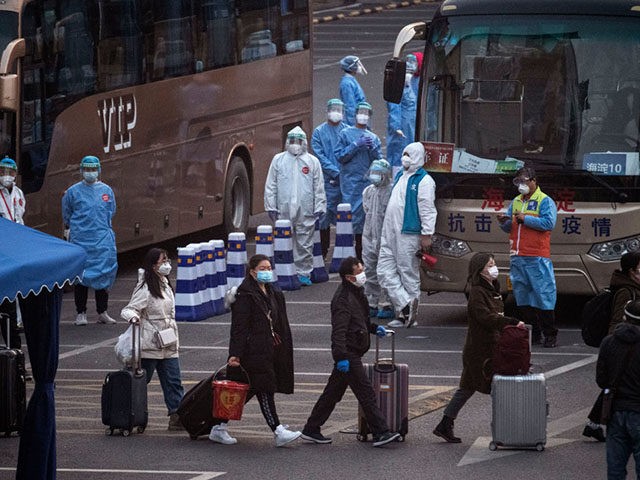China’s internal coronavirus outbreak has become so severe that all 31 of the nation’s provinces individually warned residents on Monday to avoid “unnecessary travel” following weeks of struggle to contain the virus in the east of the country.
Communist Party officials have lost control of the situation to such an extent that the Global Times, a government propaganda outlet, condemned “glaring loopholes” in pandemic management, particularly among local Communist Party officials and airport screeners, in an article published Monday.
Authorities have been warning of a growing number of coronavirus cases in Nanjing, eastern China, for over a week, locking down the city. Officials admitted this week that they are now also documenting a spike in coronavirus cases in Wuhan, central China, the city where the virus originated. Nanjing locked down last week and Wuhan has since mandated coronavirus testing for every single resident. Beijing, while far from both, has also reportedly implemented significant travel restrictions since reporting its first cases since January last week. Everywhere else in the country, Communist Party officials are discouraging “unnecessary travel,” particularly internally.
“The outbreak, which is rapidly sweeping through the nation, has exposed loopholes in Chinese cities’ daily anti-epidemic work, which sounded an alarm to the country,” the Global Times reported Monday. “Chinese experts said it showed staff members at airports and designated hospitals did not conduct strict surveillance and testing of cargo and objects.”
The Times reported that 31 “provincial-level regions” had warned “against unnecessary travel,” which would include every province, autonomous region, and special division in the country. The warning contrasts significantly with state-sponsored calls for excessive travel, even amid concerns of spreading coronavirus, for propaganda purposes during communist holidays like May Day or the anniversary of the founding of the Communist Party. The mass mobilizations after these holidays triggered outbreaks nationwide.
China’s state-run Xinhua News Agency appeared to temper the alarm of the Global Times, calling the coronavirus cases currently identified “sporadic” and assuring readers that the Communist Party was going “all out” to prevent larger outbreaks on Tuesday. It nonetheless admitted that, including Nanjing’s Jiangsu and Wuhan’s Hubei, ten other Chinese provinces were struggling with an uptick in coronavirus cases.
The Global Times, citing Chinese government-approved experts, claimed that the causes of the current outbreak were the infectiousness of the Indian variant of the Chinese coronavirus, known as “Delta,” and poor pandemic control in affected regions. In Nanjing, government officials specifically blamed a flight entering the city from Russia for contaminating passengers.
“The outbreak in Nanjing showed that the local authorities failed to properly handle the feces of coronavirus-infected patients or trash left on planes that carried confirmed cases. This reflected significant loopholes in the management of those places,” one “expert” told the Global Times on Monday.
The state propaganda outlet declared it “absolutely worrying” how rapidly cases appeared to be spreading in Nanjing in previous coverage on Sunday.
“[T]he failings in epidemic controls at airports and other facilities for coping with international arrivals must be addressed urgently,” it asserted.
The Chinese Communist Party first declared that it had completely contained the Chinese coronavirus in March 2020, following the initial outbreak of the novel pathogen in Wuhan. That month, dictator Xi Jinping — who avoided the worst of the outbreak there in the winter months — visited Wuhan to declare victory. In reality, while Beijing regularly published images showing mass congregations in cities like Wuhan after that trip, Chinese officials have consistently documented coronavirus cases nationwide since then. Prior to the current outbreak, the last streak of cases in Wuhan occurred in early July. Just as with the current case, Communist Party officials blamed foreigners, on that occasion Afghans, for bringing the virus back to its origin.
Part of the reason China has struggled to contain coronavirus cases is that it is relying on poor-quality homemade vaccines and many Chinese residents do not trust the products, choosing to remain unvaccinated. The top two Chinese-made vaccine products on the market are the injections by the firms Sinovac and Sinopharm, both used internationally. The head of China’s Center for Disease Control (CDC), Gao Fu, admitted in April that Chinese vaccines “don’t have very high protection rates,” suggesting mixing them with American mRNA technology products. Sinovac, whose product tested at only 50.38 percent efficacy against infections, has begun promoting a third dose in the hopes of increasing its protective value.
Even with an uptick in efficacy through multiple vaccinations, Beijing still contends with the issue of Chinese citizens distrusting locally developed vaccination products. Zhong Nanshan, China’s top infectious disease expert, warned in May that China was “lagging” behind countries like the United States on vaccination rates and could thus continue to experience significant outbreaks even as other countries inched towards herd immunity.
“If China continues with such a low vaccination rate, it will not keep up,” Zhong warned at a separate occasion in March.
Zhong resurfaced this week, calling the current outbreak “generally controllable” and urging mass testing and vaccination in response.

COMMENTS
Please let us know if you're having issues with commenting.